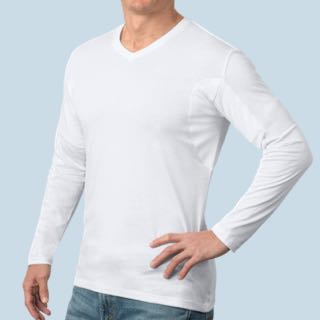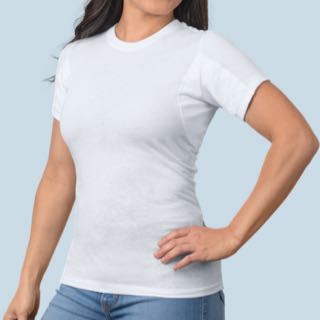Breaking Down the Relationship Between Weight and Sweating
Does weight play a role in how much you sweat? Absolutely.
Whether you’re a lean, high performing athlete at a healthy weight or overweight, sweating is an inevitable, natural way for your body to regulate its temperature - no matter your body type.
However, there are physical attributes and health conditions that can cause some individuals to sweat more than others (or even excessively).
If you’re wondering if being overweight will make you sweat more, or if losing weight might help you sweat less, you’re at the right place.
We’ll explore the relationship between weight and sweating to help you understand how they impact one another.
First, let’s understand some conditions that can affect sweating.
(Almost) Everybody Sweats
Sweating is a normal bodily function designed to cool your body down during hot weather or physical activity. But there are some circumstances in which people sweat excessively - or not at all.
Nearly 5% of the population suffers from hyperhidrosis — and thousands more live undiagnosed. People with hyperhidrosis experience excessive sweating in one area of their body. Most people with primary hyperhidrosis experience extreme sweating episodes daily.
Diaphoresis, or secondary hyperhidrosis, causes excessive, all-over sweating due to a specific underlying cause. Conditions like pregnancy, illness, or taking certain medications can cause diaphoresis. Once the underlying cause ceases, so does the excessive sweating.
Anhidrosis is a condition that prevents people from sweating normally. When your body can’t cool itself, you can overheat, sometimes to the point of having heat exhaustion or heatstroke. Anhidrosis is rare, affecting about 2% of the population.
Does Being Overweight Make You Sweat More?
If your body mass is higher, you’ll sweat more profusely.
Fat insulates the body, raising its core temperature. A higher body temperature means your body needs to sweat more to cool down.
Plus, it’s more difficult to move around with higher body weight - the increased effort taxes circulation, generating internal heat.
In short, the larger you are, the more heat your body creates and the more likely you are to sweat excessively.
Keeping your body weight within normal ranges will help your body stay cooler and drier.
While people who are overweight can also have hyperhidrosis, it’s often the case that the cause of their excessive sweating is weight-related. However, other factors may also be the cause, such as:
- DNA: Excessive sweating is a hereditary condition influenced by your genes. Studies show that 50% of people affected by profuse sweating have a known family history of it.
- Distribution of sweat glands: The placement of your sweat glands influences how much you sweat. If you sweat excessively in a specific area, you may have a higher concentration of sweat glands there.
- Metabolic rate: Your metabolic rate (how fast your body's cells turn food into energy) can affect how much you sweat. People with higher metabolic rates generate more heat than those with lower metabolic rates, causing them to sweat more.
- Sex: Women have more sweat glands, but men’s sweat glands are more active than women’s, so men tend to sweat more.
Will Losing Weight Help Reduce Excessive Sweating?
Yes and no. Leaner people tend to sweat more efficiently and handle heat better than those who are overweight.
But if fat acts as an insulator and traps heat, why do some athletes and lean people still sweat excessively?
Although it seems counterintuitive, the more fit you are, the more you sweat.
As your body becomes stronger, it becomes more efficient at burning calories, which generates more heat. Top athletes sweat much sooner during a workout compared to sedentary people.
Being overweight or obese is not uncommon. Recent findings from the Centers for Disease Control and Prevention (CDC) report that 93.3 million U.S. adults, or 39.8% of the population, are classified as obese.
The CDC describes obesity as “weight that is higher than what is considered as a healthy weight for a given height.” Body Mass Index, or BMI, is a screening tool that can help you find out if you’re overweight or obese. To calculate your BMI, use the CDC’s Adult BMI Calculator.
The health benefits of losing weight are well documented and include:
- Decreased risk of diabetes and improved blood sugar levels
- Lowered blood pressure
- Improved cholesterol levels
- Reduced risk of heart disease, stroke and certain cancers
- Improved mobility and reduced joint pain
- Decreased risk or improvement in symptoms of osteoarthritis and sleep apnea
For those who struggle with weight or obesity and excessive sweating, know that there are safe and effective solutions that can mitigate sweat and keep you dry.
Win the Battle Against Excessive Sweat
If you battle sweat on the daily, you don’t necessarily have to resort to medical procedures or medications.
Thompson Tee makes sweat proof undershirts containing patented Hydro-Shield technology that traps moisture in the underarm area, allowing it to evaporate and escape as vapor.
Thompson Tees are guaranteed to prevent 100% of underarm sweat from reaching and staining outer layers of clothing, keeping you dry and comfortable all day.
Choose from various styles and colors, available in sizes up to 3XL for men and 2XL for women. Try it risk-free for 30 days!
For more information about sweat or hyperhidrosis, check out our comprehensive resource page.


